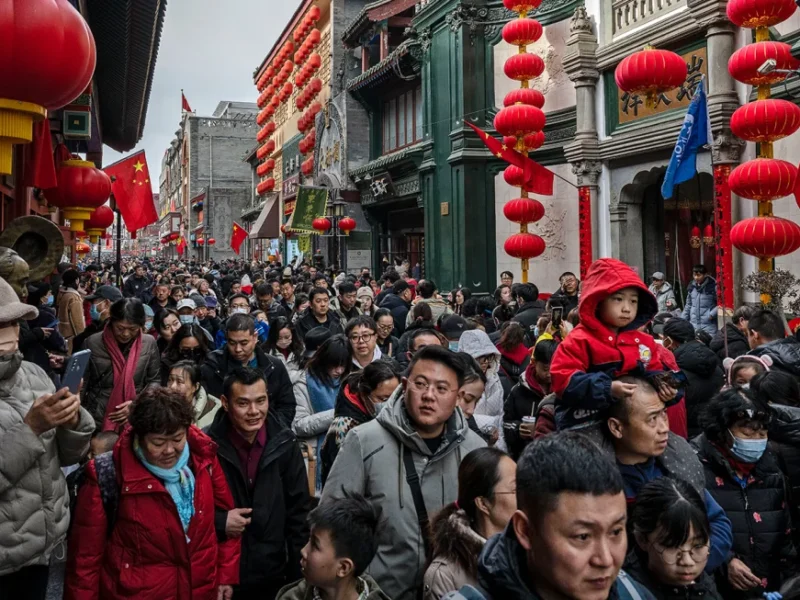China has reported a remarkable surge in travel and consumption during an extended Lunar New Year holiday season, presenting these gains as indicators of the economy’s recovery, bolstered by supportive government policies. However, despite the impressive numbers, CNN’s analysis based on official data reveals that average tourism-related spending per trip remained below pre-pandemic levels, reflecting lingering consumer caution amidst deflationary pressures.
The Ministry of Culture and Tourism disclosed that a total of 474 million trips were made within mainland China during the Lunar New Year travel season, marking a 34% increase from the previous year and a 19% rise compared to 2019. Total spending by domestic tourists reached 632.7 billion yuan ($87.9 billion) over the holiday period.
While acknowledging various favorable factors such as government policies and improved service offerings, the ministry highlighted a notable increase in people’s inclination to travel, with key indicators like trip numbers and spending hitting record highs.
This Lunar New Year holiday, spanning eight days from February 10 to February 18, was the longest in recent history, offering an extra day compared to previous years. Significantly, it was also the first holiday unaffected by the Covid-19 pandemic since 2019.
Despite the overall positive picture, detailed data on daily trip numbers and spending were not provided by the ministry. However, CNN’s calculations indicate that consumption levels fell short of pre-pandemic benchmarks. On average, there were slightly fewer domestic trips per day compared to 2019, and the average daily spending per trip dropped by 6% from pre-pandemic levels, reflecting ongoing consumer restraint.

Travelers at Hangzhou East Railway Station in China’s Zhejiang province on February 17, 2024.
Travel outside mainland China, including to destinations like Hong Kong and Macao, also failed to reach pre-pandemic levels, according to official figures.
Data from the National Immigration Administration released on Sunday showed that there was an average of 1.69 million trips into and out of mainland China per day during the holiday period. This figure represented a 6% decrease from the daily average of 1.79 million trips recorded in 2019.
While there are some positive aspects to the data, Nomura analysts advised caution in interpreting the figures. They emphasized that despite certain strengths, there are ongoing challenges facing the economy, and they maintained their view that the economic downturn is likely to worsen in the coming months.
China’s economy is contending with various difficulties, including low consumer confidence and deflationary pressures. In January, consumer prices experienced their sharpest decline in 15 years, marking the fourth consecutive month of decrease.
The box office is experiencing a significant surge in activity.
Despite overall economic challenges, there were some positive highlights during the holiday season.
While purchases of high-value items like property remained slow, there was a surge in the sale of lower-cost items. Notably, the Chinese box office saw remarkable growth, reaching a record 8 billion yuan ($1.11 billion) in sales during the eight-day holiday period, according to data from the China Film Administration. Moreover, the number of moviegoers also hit a record high, totaling 163 million.
However, despite the robust performance of the box office, analysts remain cautious about overall economic growth. The real estate sector, which plays a significant role in China’s economy, is experiencing a historic downturn. Real estate contributes up to 30% of GDP and represents 70% of household wealth. The decline in this sector has had a substantial impact on both business and consumer confidence.
According to Frederic Neumann, HSBC’s chief Asia economist, the real estate sector continues to drag down economic growth. The decrease in construction activity has negatively affected various industries, including steel, glass, cement, construction equipment manufacturing, plumbing, and architecture. Additionally, declining property prices have dampened consumer spending as households perceive a decrease in their wealth.
During the holiday season, average daily new home sales in 25 major cities dropped by 27% compared to the previous year, according to data from China Index Holdings, a prominent private property research company.
Sentiment is mixed.
Mainland Chinese markets received a modest boost on Monday following the holiday break, buoyed by mixed economic data. However, the Hong Kong market, which has been trading since Wednesday, experienced a decline.
According to Neumann, despite the slight improvement in holiday travel and economic indicators, significant challenges to growth persist. Investors are seeking more substantial stimulus measures to rejuvenate growth and are awaiting further details on stabilization efforts in the housing sector.
On their first trading day in the Year of the Dragon, the Shanghai Composite rose by 1.6%, while the Shenzhen Component increased by 0.9%. In contrast, Hong Kong’s Hang Seng Index dropped by 1%, reversing three consecutive days of gains.
China’s stock markets have been grappling with an extended downturn since reaching recent peaks in 2021, resulting in the loss of over $6 trillion in market value across the Shanghai, Shenzhen, and Hong Kong markets.











